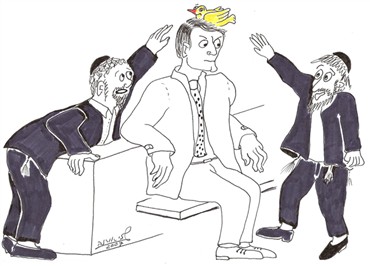
A man who happens upon a bird’s nest with a few eggs in it is prohibited from taking the bird along with the eggs. He must shoo away the bird and only then is he permitted to take the eggs. It is written in the Torah, “If, along the road, you chance upon a bird’s nest, in any tree or on the ground, with fledglings or eggs and the mother sitting over the fledglings or on the eggs, do not take the mother together with her young. Let the mother go, and take only the young, in order that you may fare well and have a long life” (Deuteronomy 22:6-7). The Talmudic sages sometimes are quite literal in explaining the text, and in this case they ruled that the nest must be found along a road, because the Scriptures read “If, along the road, you chance upon a bird’s nest.” Then what is the rule if one finds a nest, with a bird sitting upon her eggs, in the sea? In the sea, after all, there is no road. The sages ruled that the sea can indeed be considered a road, because it is written in the Tanach “Who makes a road in the sea” (Isaiah 43), meaning that one may treat the sea as a road. Therefore, anyone who chances upon a bird’s nest in the sea must send away the mother bird. If, the scholars asked, what is written in the Tanach determines what is considered a road, one who finds a bird’s nest in the skies would be required to send away the mother, for the Scriptures also call the skies a road: “The road of the eagle is in the skies” (Proverbs 30:19). The scholars rejected this comparison and said: The Scriptures discussed “the road of the eagle,” and not an ordinary road, so one who finds a bird’s nest in the skies is not obligated to send away the mother, as the nest is not upon the “road.”
The scholars continued in their efforts to clarify the issue. What is the rule, they asked, if one finds a bird sitting upon her eggs on top of a man’s head? What are the issues under debate? Is a man’s head considered “on the ground” or not? The Talmud concludes that a person’s head is considered “on the ground” and therefore the person would be obligated to fulfill the commandment of sending away the mother bird even if he happens upon a bird’s nest on top a person’s head.
(Babylonian Talmud, Tractate Chullin 139b)
